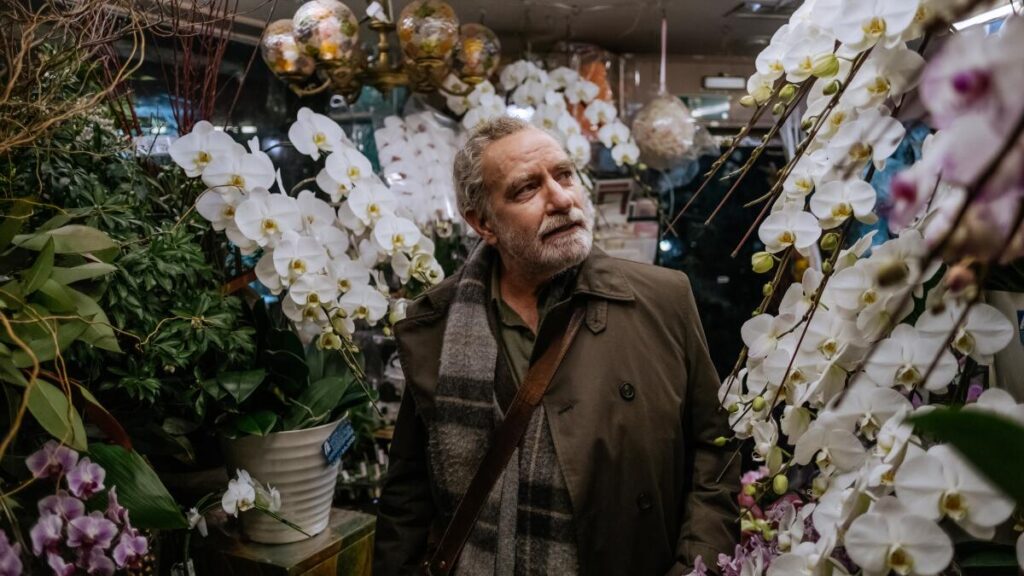Director Baltasar Kormákur, who’s forged a comfortable career toggling between Hollywood tales set in far-flung spots (“Beast,” “Adrift”) and films set in his native Iceland, returns to his home country for the sweet/sad love story “Touch,” only to continent-hop again within its two-hour running time.
Restlessness is built into the story, adapted from a novel by Ólafur Jóhann Ólafsson and centered on a romantic memory animating a widower’s attempt to solve a mystery from his past. The result, anchored by enchanting performances and Kormákur’s reliably visceral storytelling, is an appealing pivot for a filmmaker who tends to gravitate toward adrenalized tales of survival.
Veteran Icelandic actor-singer Egill Ólafsson stars as Kristofer, who at the beginning is in the process of shuttering his Reykjavik restaurant, leaving home (“Forgive me,” he says to a picture of whom we presume is his late wife) and getting on a plane for London. Radio snippets and masked workers let us know the pandemic is starting, and we see Kristofer doing memory exercises, an indication that his dementia is in its early stages. But the more pressing unknown driving Kristofer is what happened to a woman he fell for during his radical-youth college days in the UK, when he worked as a dishwasher at a Japanese restaurant.
Egill Ólafsson in the movie “Touch.”
(Baltasar Breki Samper / Focus Features)
Cue swinging ‘60s London, where we’re introduced to young Kristofer — played by the director’s shaggy-haired beanpole of a son, Pálmi, an untrained actor — and kind-eyed Miko (a radiant Kōki), daughter and fellow employee of the restaurant’s hard-working owner, Takahashi-san (Masahiro Motoki). Very quickly, thanks to cinematographer Bernsteinn Björgúlfsson’s warm, inviting cinematography and production designer Sunneva Ása Weisshappel’s lived-in, detail-rich restaurant set, we sense that this flashback is the movie’s central story, a comforting haven for a makeshift family of immigrants.
Before long, a mentor relationship develops between the restaurant’s alternatingly stern and gregarious proprietor and his unlikely new employee, who drops out of school to immerse himself in Japanese culture, from learning the language to cooking the food and even writing haikus. At the same time, an intimacy develops between the two young people under this thriving eatery’s roof, in stolen exchanges away from everyone’s eyes. But it’s a passion which English-speaking Miko has reasons to keep from her watchful dad, who still wrestles with the real and psychological scars of their lives in Japan as survivors of the bombing of Hiroshima.
Eventually, as the past reaches its expectedly woeful end and the present’s possibility takes over, the older Kristofer — keenly underplayed by Ólafsson — makes his way to Hiroshima, where all is revealed about a romance cut brutally short 50 years prior. But it’s also when what had been a quietly engaging tale, one of strong-willed individuals from wildly different backgrounds bonding in a foreign land, is ultimately hamstrung by the added weight of historical incident. Though Miko’s connection to the bombing is sensitively handled, especially considering how the pandemic plays into the final scenes (which are marked by a touching performance from Yoko Narahashi, the film’s casting director), it also feels shoehorned in as a plot device.
But even after the pall of historical tragedy thickens, “Touch” is still perfumed with much to admire for a love story, especially where Kormákur’s compassionate way with actors is concerned. His résumé of action films obscures the fact that he also loves what can happen in a small space with looks, words and gestures. He sees sparks between humans everywhere, and that consistency of tenderness is an infectiously apt approach for a gentle movie in which an old man has clung to the memory of such feelings for decades, hoping to give them life one more time.
‘Touch’
In Icelandic, English and Japanese, with subtitles
Rating: R, for some sexuality
Running time: 2 hours, 1 minutes
Playing: In limited release July 12.

